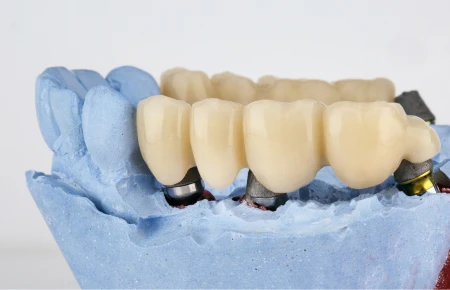Dental Bridges

Dental bridges are an excellent option for replacing missing teeth. A bridge is a fixed restoration that is used to span the gap created by one or more missing teeth. It is made up of two crowns with a false tooth in the middle. The two crowns are placed on the teeth adjacent to the gap and they are used to support the false tooth in the middle.
Dental bridges are often used when a patient has lost a tooth or multiple teeth due to injury, decay, or periodontal disease. They are also used when a patient has a large gap between their teeth that needs to be filled. Bridges can be made of porcelain, gold, or a combination of the two materials.
The process of getting a bridge usually takes two to three visits to the dentist. During the first visit, the dentist will take an impression of the teeth and the surrounding area. This impression will be used to make a model of the bridge. During the second visit, the dentist will prepare the adjacent teeth for the bridge by removing any decay and reshaping them to fit the bridge. The bridge will then be fitted and adjusted to ensure a proper fit. During the third visit, the bridge will be cemented or bonded into place.
What are the types of dental bridges?
- Traditional Bridges: This type of bridge consists of a fake tooth which is known as a pontic and is held in place by two crowns on either side, which are attached to the abutment teeth.
- Cantilever Bridges: This type of bridge involves anchoring the pontic to a single abutment tooth.
- Maryland Bridges: This type of bridge uses a metal or porcelain framework to bond the pontic to the abutment teeth.
- Implant-supported Bridges: This type of bridge is supported by dental implants, instead of natural teeth. This type of bridge is more stable and can replace multiple missing teeth.
What type of dental bridge is the best?
The type of dental bridge that is the best for an individual depends on their specific oral health needs and preferences. Generally, the three main types of dental bridges are traditional bridges, cantilever bridges, and Maryland bridges. A traditional bridge is the most common type of bridge and involves creating a crown for the tooth or implant on either side of the missing tooth, with a false tooth in between. A cantilever bridge is used when there are teeth on only one side of the missing tooth and involves anchoring the false tooth to the adjacent tooth. A Maryland bridge is a more conservative option that involves attaching a false tooth to a metal framework that is bonded to the back of the adjacent teeth. Your dentist can help you decide which type of bridge is best for you.
What are the advantages and disadvantages of dental bridges?
Advantages:
- A dental bridge can replace one or more missing teeth, restoring the appearance of your smile.
- Bridges can also help maintain the shape of your face and your bite.
- Dental bridges can be an effective solution that is long-lasting, cost-efficient, and relatively easy to install.
Disadvantages:
- The teeth adjacent to the bridge may be damaged due to the extra pressure on them.
- Sometimes, the bridge may not fit properly, require more adjustments, or even cause further damage.
- Dental bridges may require more frequent maintenance than other treatments, such as implants or dentures.
- The cost of dental bridges can be quite high, depending on the type of bridge needed and the extent of the procedure.
Dental Bridges vs Dental Implants: Pros and Cons
Dental Bridges:
Pros:
- Can be placed quickly in one or two appointments
- Economic
- Easier to maintain
- Allows for more normal chewing and speaking
Cons:
- Not as long-lasting as implants
- Can potentially damage the adjacent teeth
- It does not prevent bone loss
- Not as aesthetically pleasing as implants
Dental Implants:
Pros:
- Long-lasting
- Durable
- Natural looking
- Stops bone loss
- Can last a lifetime
Cons:
- More expensive than bridges
- Requires surgery
- May require additional procedures
- Longer treatment time
To learn more about dental bridge opportunities in Rochester Hills Michigan and ask your questions, give us a call at 248-650-2440 or visit our dental clinic .
Please visit our Facebook page for more information.






